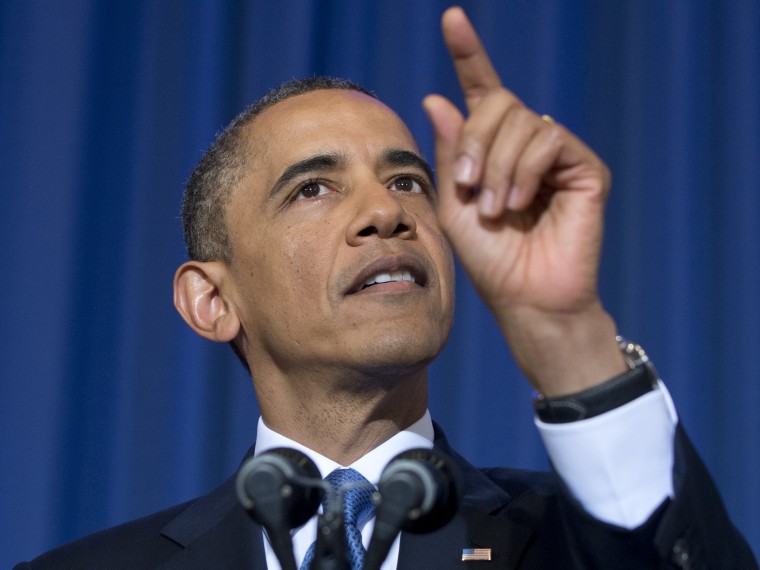In his speech at the National Defense University Thursday, President Obama said the United States must "define the nature and the scope" of the fight against national security threats. He gave his clearest explanations yet of how he plans to deal with detainees at the prison at Guantanamo Bay, to use drones, and to shift the country out of a state of perpetual war.
But in the course of his hour-long remarks, Obama did not address a number of pressing issues, raising questions about how significantly his counterterrorism policy will actually change in the next three years.
The Obama administration acknowledged that the United States had killed four American citizens in drone strikes since 2009. The president laid out his rationale for using targeted lethal force, calling drones "legal" and "effective." He insisted that only "al Qaeda and its associated forces" are targeted, and that even then, "the use of drones is heavily constrained"--although he did not spell out the definition of "associated forces." He did not commit to releasing the legal memos that lay out the justification for drone strikes or account for the thousands of collateral deaths that have occurred.
The president also avoided explaining exactly what information has been included in the briefings that Congress receives in advance of drone strikes, and he didn't describe what future increased oversight will be. Also notable for its absence: any mention of "signature" strikes, which target individuals based on patterns of behavior deemed to indicate militancy, without information on the target's actual identity. Some have interpreted the use of force rules released by the administration Thursday to mean an end to signature strikes, but neither Obama nor the rules explicitly commit to ending the practice.
Drone strikes are a tool in the 12-year-old war on terror--a war, the president said, that cannot continue. American involvement in the Afghan war is winding down and al Qaeda has been decimated, he said, and while the United States must defend itself against threats going forward, "this war, like all wars, must end. That’s what history advises. That’s what our democracy demands." But last week Michael Sheehan, the assistant secretary of defense for special operations and low-intensity conflict, testified at a Senate hearing that he believed the war on terror will last "at least 10 to 20 years” from now.
Perhaps most troubling to human rights and civil liberties advocates was what the president didn't say when he laid out his new plan to close Guantanamo Bay. Obama once again called on Congress to lift the restrictions on detainee transfers (despite the fact that he has the power to order the Secretary of Defense to issue waivers that would allow prisoners to go home). He did announce that he would appoint a new senior envoy to arrange prisoner transfers and would lift his moratorium on transferring detainees to Yemen.
Obama conjured the devastating legacy that inaction on Guantanamo would leave. "Imagine a future--ten years from now, or twenty years from now--when the United States of America is still holding people who have been charged with no crime on a piece of land that is not a part of our country," he said. "Look at the current situation, where we are force-feeding detainees who are holding a hunger strike. Is that who we are?"
While he spoke movingly of the moral imperative to lessen the suffering of men who have been held without trial or charge for years, Obama made no promise to discontinue the practices of indefinite detention or military commissions, both of which have been condemned by human rights organizations here and abroad. Obama acknowledged that if all the men cleared for transfer leave the prison, there will still be men whom the government deems to be dangerous but "who cannot be prosecuted, for example because the evidence against them has been compromised or is inadmissable in a court of law." On the question of how to prosecute these men fairly under the constitution, the president said only that he is "confident that this legacy problem can be resolved."
Military commissions, notoriously slow and opaque, will be an inefficient way to prosecute terrorism cases once the prisoners are relocated to the United States, as Obama promised to do. So it could still be years before the men stand trial. "Moving the location of Guantanamo does not make the just prosecution of people any quicker," Laura Murphy, Director of the Washington legislative office of the American Civil Liberties Union told msnbc. "I don’t know what is in his speech that would make us believe that these people are going to be prosecuted any more quickly. There wasn't a time commitment."
Human Rights Watch Executive Director Kenneth Roth echoed Murphy's skepticism. "The president’s plan to move detainees into the United States, including for prosecution before discredited military commissions, is not the answer. The detainees should either be prosecuted in US civilian courts, or released."
A group of 1,300 activists including Daniel Ellsberg, John Cusack, and Medea Benjamin of Code Pink signed an ad published in the New York Times calling on President Obama to close Guantanamo and “stop the torture.”
Benjamin attended the speech and interrupted the president more than once to demand the immediate release of the 86 cleared prisoners and question the president’s handling of the drone program. “The voice of that woman is worth paying attention to,” Obama said. But he quickly returned to his prepared remarks.
